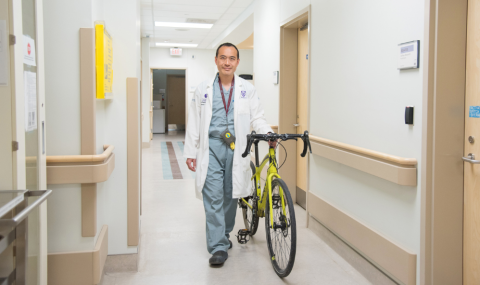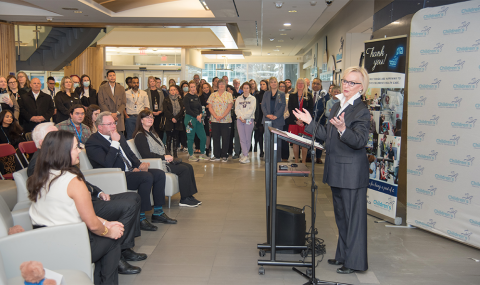Nephrology Nurses
The nephrology nurses at London Health Sciences Centre are Registered Nurses and Registered Practical Nurses professionally trained in the specialized care of people with kidney disease. A nephrology nurse has a knowledge that applies to all ages, because children as well as adults and seniors are affected by kidney disease. Nephrology nurses are registered with the College of Nurses of Ontario.
A nephrology nurse’s responsibilities focus on health and wellness, preserving kidney function, implementing treatment measures, performing dialysis and assist in transplant care.
Nephrology nurses at LHSC work in the:
- Chronic Kidney Disease Clinics
- Kidney Transplant Clinics
- Outpatient Hemodialysis Units
- Inpatient Nephrology units
- Home Hemodialysis Unit
- Peritoneal Dialysis Unit
Nephrology nurses work in all stages of chronic renal failure and are available throughout your health care journey.
How Can your Renal Nurse Help You?
Nephrology nurses often help patients and families by:
- Educating patients and families. One of the main roles is teaching patients about their disease, treatments and prevention. Along with general nursing knowledge and skills, nephrology nurses have specialty training in hemodialysis, transplantation and renal therapy.
- Assessing patient needs and advocating for identified needs.
- Assisting patients to achieve a maximum level of desired independence.
- Promoting health and wellness through active support.
- Sharing knowledge in the various treatment options available to patients facing kidney disease.
Nurse Case Manager (NCM)
A NCM is a nurse registered with the College of Nurses of Ontario. In the Renal Program NCMs provide you with education and support to help you maintain kidney function for as long as possible through the use of self-management skills.
"I would encourage any patient to make use of the team" YouTube video
NCMs provide you with information about the different treatment options that are available (Hemodialysis, Peritoneal Dialysis, Home Hemodialysis, Transplant and Conservative Management) to help in making a well-informed choice about treatment before your kidneys reach the point when they are no longer working. NCMs provide you with education about the type of body access that is required to perform the chosen dialysis treatment.
Sometimes people start dialysis unexpectedly - ‘an acute start’ and they have not had the opportunity to meet a NCM. NCMs are available to meet with you after you start dialysis as well to provide the same type of education and support opportunities.
Nurse Case Managers work in the:
- Chronic Kidney Disease Clinics
- Body Access Clinics
- Hemodialysis Units
- Hospital Units
The Nurse Case Manager can help you navigate through the various types of appointments that are required for education, assessment and planning to be prepared for a timely start of treatment, with the best dialysis body access. Learning about living with a chronic condition, planning ahead, talking with your family to make informed choices takes time - utilize the services of the NCMs, we are here to help! At your next Nephrologist appointment ask to speak with your Nurse Case Manager.
Nurse Practitioner
The Nurse Practitioner (NP) is a registered nurse with additional education and authority to make medical changes to your dialysis and prescriptions. They work independently and along with your nephrologist. There are 6 NPs working in the kidney program.
In the London hospitals and Westmount dialysis units, you will see the NP a few times a week to meet your dialysis needs. In satellite dialysis units the NP can be contacted by your nurse to make changes to your care when needed. About every three months you will meet with either the NP or the nephrologist at your dialysis unit to assess and adjust your plan of dialysis care.
How the NP helps you:
- Is available for, and addresses, dialysis related medical concerns and questions
- Explains your bloodwork and test results to you
- Assesses your monthly bloodwork and initiates adjustments to your dialysis care and other medications
- Provides dialysis related medication prescriptions
- Initiates referrals to specialists for dialysis body access and transplant assessments
- Smooths your transitions through different aspects of the kidney program.
- Leads research to improve health care and the dialysis experience.


